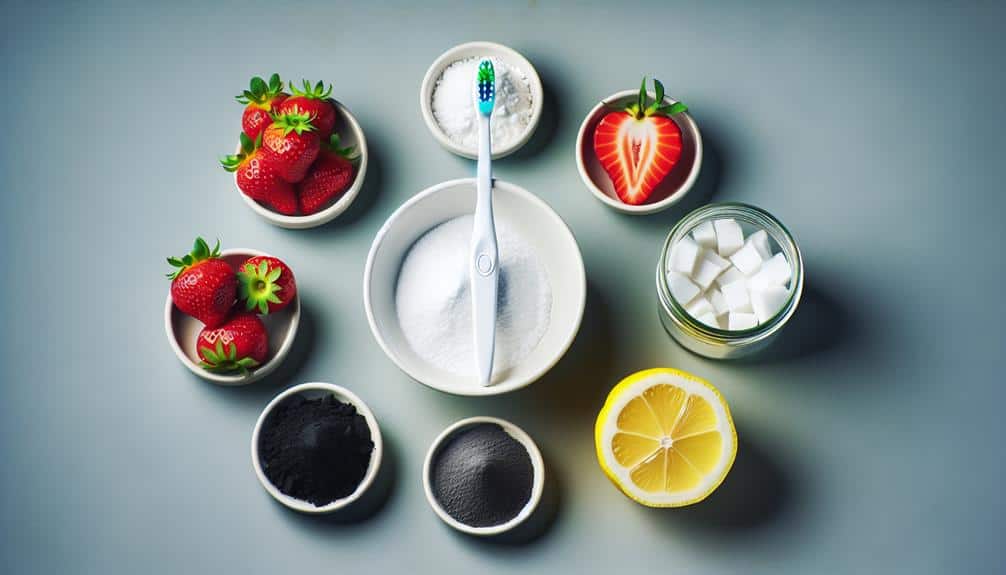Improve your smile with these 7 expert tips for whitening your teeth: Consider professional treatments for quick results tailored to your needs. Try whitening toothpaste and mouthwash consistently, but watch for sensitivity. Opt for oil pulling with coconut oil to combat bacteria. Use baking soda to remove surface stains gently. Experiment with hydrogen peroxide cautiously for cost-effective DIY whitening. Remember to avoid staining foods and drinks like berries and coffee. Finally, maintain your bright smile with regular dental check-ups. Enhance your smile with these tips, and discover more ways to improve your oral care routine.
Key Points
- Professional whitening treatments for quick, reliable results.
- Use whitening toothpaste consistently for best results.
- Oil pulling with coconut oil helps combat mouth bacteria.
- Baking soda acts as a gentle abrasive for stain removal.
- Consult dentist before using DIY whitening methods.
Professional Whitening Treatments
If you're searching for the most effective way to whiten your teeth, professional whitening treatments offer quick and reliable results. Professional treatments, often conducted in a dental office, utilize stronger whitening agents compared to over-the-counter products. These treatments are administered by trained professionals who can tailor the process to suit your specific needs, ensuring maximum effectiveness and safety.
One of the key advantages of professional whitening treatments is the speed at which you can achieve noticeable results. In just one session, you can notably lighten the shade of your teeth, providing immediate gratification. Additionally, these treatments often involve protective measures to shield your gums and other sensitive areas in your mouth from the whitening agents, minimizing the risk of irritation.
While professional treatments generally yield faster and more dramatic results, they can be more costly than at-home options. However, many people find the investment worthwhile due to the speed and efficacy of professional whitening treatments. If you're seeking a quick and reliable way to brighten your smile, professional whitening treatments are a compelling choice to contemplate.
Whitening Toothpaste and Mouthwash
To enhance your teeth whitening results, think about integrating whitening toothpaste and mouthwash into your oral care routine. Whitening toothpaste and mouthwash can be advantageous in maintaining a brighter smile while also providing additional oral health benefits. Here are some key points to contemplate:
- Tooth sensitivity: Some whitening toothpaste and mouthwashes may contain ingredients that can lead to increased tooth sensitivity. Look for products that are specifically designed to minimize sensitivity.
- Enamel protection: Choose whitening toothpaste and mouthwash that not only brighten your teeth but also help protect your enamel. Enamel is essential for maintaining strong and healthy teeth.
- Consistency is key: Use whitening toothpaste and mouthwash consistently as directed to see the best results over time.
- Consult your dentist: If you experience any excessive sensitivity or other issues, consult your dentist for personalized recommendations.
- Avoid overuse: While whitening products can be effective, using them excessively can lead to enamel damage. Follow the instructions provided to avoid any potential harm to your teeth.
Oil Pulling for Brighter Teeth
Consider integrating oil pulling into your oral care routine for a brighter smile and improved dental health. Oil pulling involves swishing coconut oil in your mouth for about 15-20 minutes, pushing and pulling it through your teeth. The lauric acid in coconut oil has antimicrobial properties that can help combat bacteria in the mouth, promoting healthier gums and fresher breath.
One of the significant benefits of oil pulling is its ability to reduce harmful bacteria in the mouth that can lead to plaque buildup and tooth decay. Additionally, some individuals report that oil pulling helps whiten their teeth naturally over time. However, it's crucial to note that oil pulling isn't a substitute for regular brushing and flossing.
Drawbacks of oil pulling include the time commitment required for each session and the need to make sure that the oil isn't swallowed, as it contains bacteria and toxins removed from the mouth. Integrating oil pulling into your routine a few times a week can be a valuable addition to your oral care regimen.
Avoid Staining Foods and Beverages
When aiming to maintain a bright smile, take care to avoid certain foods and beverages that can cause staining. Dark-colored beverages like coffee, tea, and red wine are common culprits that can discolor your teeth over time.
Additionally, foods like berries, tomato sauce, and curry can also contribute to staining, so be mindful of your consumption to preserve your pearly whites.
Food to Avoid
Steer clear of foods and beverages that are known to cause staining on your teeth to maintain a bright smile. To preserve the effects of your teeth whitening efforts, consider the following:
- Dark Berries: Blueberries, blackberries, and cherries can leave stains.
- Coffee and Tea: These popular beverages can dull the brightness of your smile.
- Red Wine: The deep color of red wine can cause discoloration on your teeth.
- Curry: Its vibrant hue can have a lasting impact on your tooth color.
- Soy Sauce: This condiment is known for its ability to stain teeth.
Being mindful of these staining culprits and incorporating them into your teeth whitening diet can complement your stain prevention techniques effectively.
Beverage Choices
Choose your beverages wisely to maintain the brightness of your smile and avoid staining on your teeth.
When it comes to Tea vs. Coffee, opt for tea as it's less likely to stain your teeth compared to coffee, which can leave stubborn stains.
Additionally, choosing Water vs. Soda is essential for teeth whitening. Water not only helps in rinsing away food particles that can cause staining but also keeps you hydrated, promoting overall oral health.
On the other hand, soda, especially dark-colored ones, can erode enamel and contribute to teeth discoloration.
Making these simple swaps in your beverage choices can go a long way in preserving the whiteness of your teeth and enhancing your smile.
Use Baking Soda for Stain Removal
To effectively remove stains from your teeth, consider utilizing baking soda as a natural and gentle remedy. Baking soda offers several benefits for teeth whitening and can be easily incorporated into your DIY techniques. Here are some key points to keep in mind:
- Abrasive Properties: Baking soda acts as a mild abrasive that helps scrub away surface stains on your teeth.
- pH Balance: It helps neutralize acids in the mouth, which can contribute to discoloration of the teeth.
- Plaque Removal: Baking soda can aid in removing plaque buildup, which can make your teeth appear yellow.
- Fresh Breath: Its antibacterial properties can also help freshen your breath by reducing bacteria in the mouth.
- Gentle Whitening: Baking soda offers a gentle whitening effect, making it suitable for regular use without causing damage to the enamel.
Incorporating baking soda into your oral care routine can be a cost-effective and natural way to maintain a brighter smile.
Hydrogen Peroxide for DIY Whitening
Consider integrating hydrogen peroxide into your teeth whitening routine for a cost-effective and DIY approach to achieving a brighter smile. Hydrogen peroxide is a common ingredient in many teeth whitening products due to its ability to remove stains and whiten teeth effectively. When using hydrogen peroxide for teeth whitening, it's important to do so cautiously to avoid potential risks associated with overuse.
One alternative to using hydrogen peroxide is lemon juice, which some individuals use for its natural whitening properties. However, it's significant to mention that lemon juice is acidic and can erode tooth enamel if used excessively. If you opt for lemon juice as a whitening agent, make sure it's diluted and used sparingly.
As with any DIY whitening method, there are risks involved. Overusing hydrogen peroxide or other whitening agents can lead to tooth sensitivity and gum irritation. It's advisable to consult with your dentist before incorporating hydrogen peroxide or other DIY whitening methods into your oral care routine to ensure they're safe and suitable for your teeth.
Regular Dental Check-ups for Maintenance
Routine dental check-ups are essential for maintaining your oral health. By scheduling regular appointments, you allow your dentist to detect any issues early on, preventing potential complications.
These periodic visits also enable your dentist to provide preventive care, keeping your teeth and gums healthy in the long run.
Check-Up Frequency Importance
Maintaining a consistent schedule for dental check-ups is essential for ensuring the health and brightness of your smile. Regular dental check-ups play an important role in maintaining good oral health and preventing dental issues. Here are some key reasons why the frequency of these check-ups is significant:
- Early Detection: Catching dental problems early can prevent them from progressing.
- Preventive Care: Regular cleanings and exams help prevent cavities and gum disease.
- Professional Advice: Dentists can provide personalized guidance for your dental care routine.
- Treatment Planning: Allows for timely treatment planning if any issues are detected.
- Overall Health: Poor oral health can impact your overall well-being.
Make sure to prioritize your dental check-ups to keep your smile healthy and bright.
Early Detection Benefits
Prioritize your dental check-ups to benefit from early detection advantages in maintaining your oral health. Regular visits to your dentist play a vital role in monitoring your oral hygiene and dental health.
Through these check-ups, your dentist can spot any potential issues early on, such as cavities, gum disease, or signs of oral cancer. Early detection allows for prompt intervention, preventing the progression of problems that could lead to more extensive treatments down the line.
Preventive Care Advantages
To ensure excellent oral health, it's important to regularly attend dental check-ups for preventive care benefits. Preventive measures play a significant role in maintaining a healthy smile.
Here are some advantages of incorporating regular dental check-ups into your lifestyle choices:
- High-quality Detection: Identifying issues before they escalate.
- Essential Cleanings: Removing plaque and tartar buildup effectively.
- Education: Learning proper oral hygiene techniques.
- Preventive Treatments: Addressing concerns before they worsen.
- Overall Health Monitoring: Detecting systemic conditions that manifest in the mouth.
Frequently Asked Questions
Can I Whiten My Teeth if I Have Sensitive Teeth or Gum Issues?
When dealing with sensitive teeth or gum issues, it's important to approach teeth whitening cautiously. Opt for whitening products designed for sensitive teeth or consult your dentist for professional advice. Protect your oral health while achieving a brighter smile.
Is It Safe to Use Natural Remedies Like Charcoal or Turmeric for Teeth Whitening?
Using charcoal or turmeric for teeth whitening is popular, but safety varies. Charcoal may be effective but abrasive, potentially damaging enamel. Turmeric has less risk but may not whiten as dramatically. Consider professional whitening for safer, more predictable results.
How Long Will It Take to See Noticeable Results From At-Home Whitening Treatments?
Results from at-home whitening treatments vary based on individual factors. Typically, you may notice improvements in 1-2 weeks. Consistency is key for product effectiveness. Follow instructions diligently to achieve desired whitening timeline and maintain oral health.
Are There Any Long-Term Side Effects of Frequent Teeth Whitening?
Regular teeth whitening may lead to potential risks like enamel damage and increased tooth sensitivity. Long-term effects could include gum irritation and uneven coloring. It's essential to seek professional advice and take necessary precautions for peak oral health.
Can I Whiten My Teeth if I Have Dental Fillings or Crowns?
Yes, you can whiten your teeth with dental restorations like fillings or crowns, but the whitening options may have limitations. The effectiveness varies based on the type of restoration, and some may not whiten as well.



